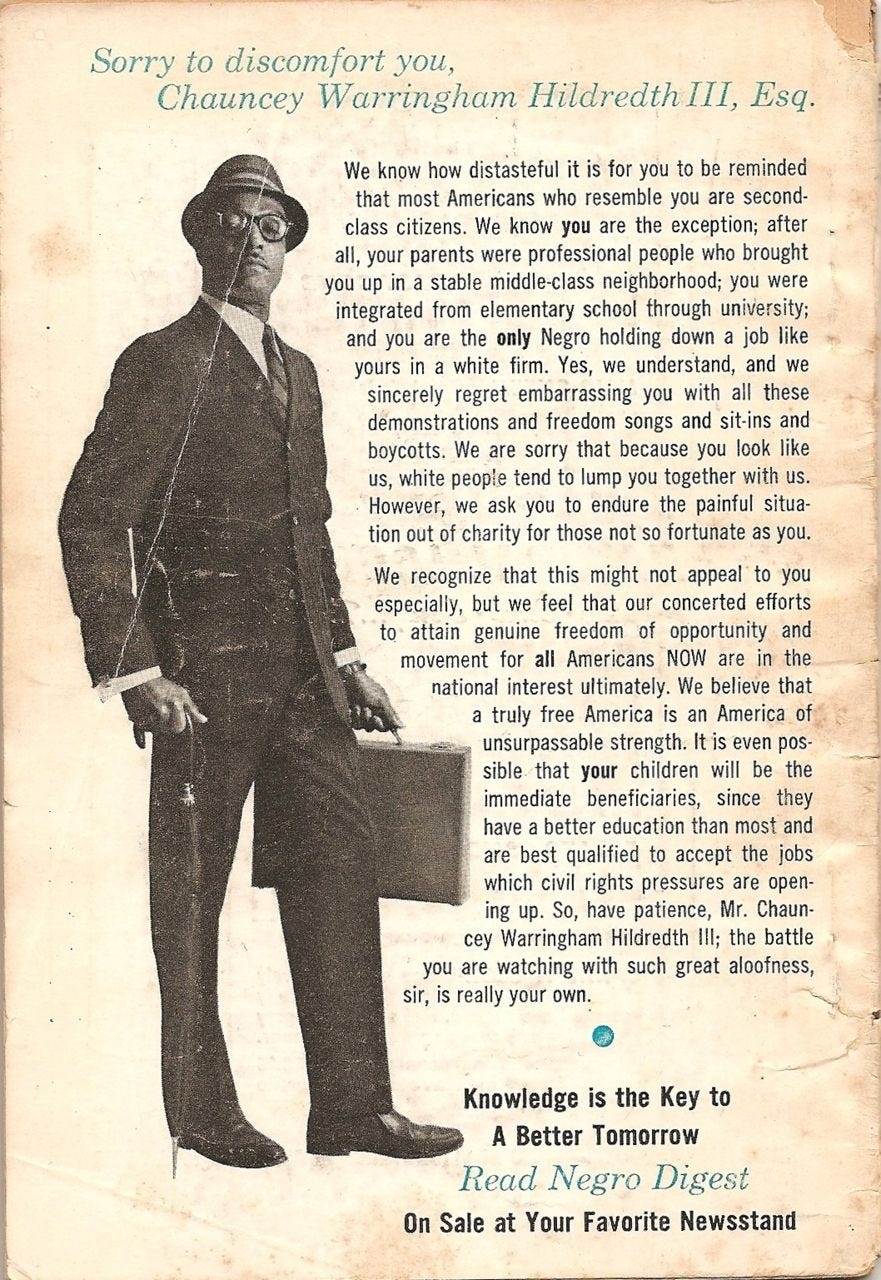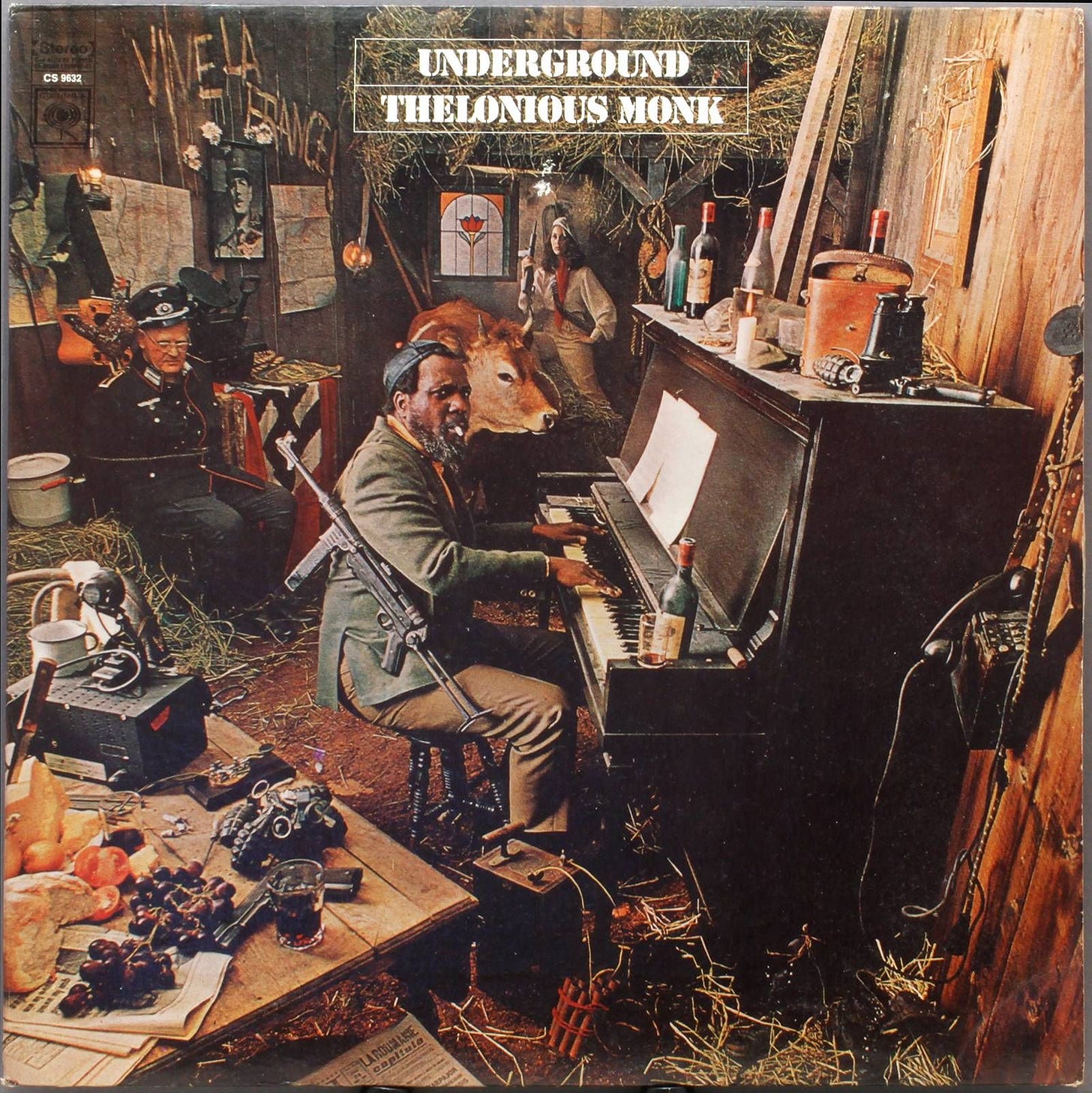The Post-Negro Citizen
How I see it.
Every few years, I used to write and then forget an essay called “The End of My Blackness”. This is basically because I walked through a glass ceiling and then poked around for another sort of blackness to grab onto. I don’t know how many years ago I stopped re-writing that essay and stopped re-inventing my take on my own blackness, but I’m going to guess it was somewhere around 2008 when I stopped being political. So I guess what I’m saying is that I’m not politically black. Make of that what you will.
The longer I spend time without a particular black political or cultural project in mind, the deeper I feel myself disconnected to whatever passes for blackness in the American mainstream. I recognize that a large fraction of that is the intersection of pop culture and youth culture with some archetypal themes and genres. So I don’t feel left out or special at all. I’m easily GenX and Old School and a host of things that young and popular / populist are not. But there are some very specific differences and distances that I am separated by that I would like to call out, some purposeful, others not.
Conceptually: Black Consciousness
For better or worse I was born into a Black Consciousness Movement family. Meaning while it said Negro on my birth certificate and there was no such thing as blackness, my parents, aunts and uncles attached themselves to Black Power with the quickness. Two years after the passage of the Civil Rights Acts, my father founded the Institute for Black Studies. He was one of the original Watts Poets and ours was one of the first families to celebrate Kwanzaa here in Los Angeles. So long before James Brown was saying it loud, I was black and proud.
When I look back on this, what strikes me are two particular things. The first is the distance I had to travel in order to get ‘the message’, which was essentially nowhere. I compare that to the process other black Americans travel to adopt some aspect of black consciousness. Presuming they are not racially essentialist, their adoption of black politics and intellectuality comes from their interaction with people of the movement. This comes with dissonance inherent in the degrees of separation from original sources. I’m not suggesting that my own parents didn’t learn anything secondhand from the likes of J. A. Rogers or some notion from Ebony or Jet magazines. But I did get to meet some of the people, like Louis Stokes. Consequently, I never had the psychological shame of black identity. I never needed anything in the realm of self-esteem, or a need to prove myself to white people. I never suffered the DuBoisian dilemma of double consciousness, certainly owing to my own parents’ efforts to insure I did not.
The second is the constructed aspect of the Black Consciousness, Black Arts, and Black Power movements. I always saw them as specific actions from specific individuals enjoined in response to specific conditions in specific places. In other words, not only my blackness had an end date, but so did all of those socio-political endeavors. To live through and witness the failure of Pan-Africanism in the post-colonial period was a striking lesson. If the project of original black consciousness, which incidentally might have named us all Afro-Americans, was right for all Negroes under all circumstances, we wouldn’t have tried Afrocentrism. Nevertheless, there were a lot of ideas incubated in the early and mid 60s that still haven’t lost their grip on American imagination. That does not make them permanently useful.
So I easily saw from that conceptual standpoint that there would be advances made. There would just as easily be regression. But the clearest lesson I learned during my undergraduate years was that despite all calls for unity, there was not black racial unity of any sort except perhaps one. That was the universal condemnation of racial discrimination. I say perhaps, because it has never been universally agreed that the best solution was fighting fire with fire. This is something we clearly see in the wake of the recent Supreme Court decision on Affirmative Action. People presume that it’s OK for blacks to accept racial discrimination for the purposes of inclusion, but that is hardly the case.
Economically: Black Class
If one devoutly wishes not to become heir to all the heartache and thousand natural shocks their dark flesh is heir to in America, where does one seek distinction? How does one escape? The obvious space for me was in class, specifically the enablements of upward mobility. Spondoolicks. Ducats. Dosh. Dollar dollar bills y’all. If you need to split the difference in your guesstimation of the flavor of racism you feel is inevitably rolling your way, you must know that some of your enemies detest your ignorance, poverty, filth, promiscuity, impiety, sloth, wrath and/or mendacious obsequiousness. After all, every way of being inferior has a name. So which of these faults must you overcome?
I never thought, without putting on imperious airs, that I was lacking anything but money. Moreover, I felt angry that nobody in my family seemed to know or care about the stuff. In fact, we seemed to have a certain disdain for it. Despite my frustration about this, I continued with that same love-hate relationship to it. I never quite respected that which riches delivered to the person, yet I remained fascinated by my perception of the number of stumbling blocks the affluent needn’t concern themselves with.
These days, I consider myself possessed of a sophisticate heuristic for determining class, which I believe to be primarily American but still broader than that. I haven’t been satisfied by Veblen or Fussell and I haven’t bothered much with Tocqueville - rather assuming that his observations are essentially conventional wisdom now. Yet I still, as always have made much more of class than race while denying the essentialisms of both.
I have extrapolated my observations about class from Andrew Hacker and Thomas Sowell and then race-normed them. Meaning that if I divided chunks of various ethnics in America into quintiles, I strongly believe that I would see the same class dynamics at the border conditions of each group. There are easily crazy rich Asians who slum and troll just like there are crazy rich white Westsiders in LA who thought Bullworth was a brilliant movie. Every group has their Beto O’Rourkes and their Donald Trumps, their Karens, their cousin Pooters and their American Psycho yuppies. They signify and symbolize markers of success or failure. So I have specifically talked about {hill, burb, hood, ghetto, sticks} dividing up ‘the’ American black community and made commentary about upward and downward mobility across those classes. However since I gave up my own privileged role of being some sort of proselytizing black Tocqueville back in the 90s, my byword has been “Don’t second-guess black people.” That doesn’t stop me from playing out my class privileges in America. Like Bobby Brown said, it’s my prerogative.
Now I don’t really care what all of that adds up to - what it makes me. I’m not very good at exploiting my place, my image or whatever that is. So I’m pretty sure I have class, and it’s more important to me than having race. I’m just not sure that there are consistent ways to use those things except to weigh against the abuse of power inherent in their exploitation.
So in the end it boils down to money. If I’m money at all, I’m New Money. But I really like the idea of shabby gentility. I like the crazy implications of Thelonious Monk’s most dangerous photo in the world - knowing he didn’t live like that, but actually lived with [slumming?] Scandinavian royalty. That, of course brings us to Culture.
Socially: Black Culture
In my small town called Black, which was Black Los Angeles in the 60s & 70s, everybody [black] listened to the two radio stations. KJLH on FM, KGFJ on AM. Everybody knew all of the DJs and had their favorites. Then two things happened. The first thing was that two new radio stations were born. KACE on FM and KDAY on AM. Most people know 1580 KDAY as the first West Coast station to play hiphop, but that was still years away. The second thing that happened was KUTE-102 became a crossover station. Lucky Pierre was the DJ I remember most. We got a McDonald’s in our neighborhood and there were black actors in the McDonald’s commercial. Jack in the Box made a kid named Rodney Allen Rippy into a sensation. That kid could have been my little brother. It was 10 years after the passage of the Civil Rights Act and people had long been fatigued from racial strife. It was time to laugh, shake your booty and get down on it. Crossover was real. It might be 7 years before Kool & The Gang’s Celebration was played at the Super Bowl, the NBA Championship and the release of the Iranian hostages, but we understood the vibe.
The small town called Black was cracking open. We went from two radio stations to four, and then R&B was going further with more dignity than blaxploitation ever had. We shared that vibe with bands like Hiroshima and War. It wasn’t just blackfolks. Even Elvis Presley’s Ghetto song was bringing a tear. By the Reagan Era, there were multiple kinds of funk, punk, new wave, disco, and the original wild style hiphop. The movie Fame which won an NAACP Image Award was the beginning of the end of pop culture as we knew it.
Racially: The Negro Race
I want to go on and on about black cultures, but here is where I throw the curveball. Some of you have heard me use the term ‘Negro Race’ before, and I think I have to take a stand. If the term ‘blackness’ is to have any weight at all, it has to be something that transcends the concepts of the Negro Race. That very idea, transcending the Negro, was the purpose of the creation of Black Consciousness to begin with. If we turn back and subsume the entirety of Afro-America into the Negro Race again, then I think we have to admit that R.R.E.A.M. Race rules everything around me. In other words, we have to put all Negros into a bucket and have a well-defined set of priorities to solve the Negro Problem. That’s regressive. That’s going backwards. That’s essentially saying that nothing has worked well for any Negro and becoming black puts you into the same vulnerabilities in America as before WW2. It’s saying White Supremacy is deterministic and the cause of our most serious problems. ‘Our’ because I (from the One Drop Rule) would have no choice but to accept that I am part of that race. I cannot. Neither can you my brother. There is no longer a Negro Problem. It has been solved. And that vast nebulous demographic of African-American which includes all of those 46 million alive today as well as all the dead from the beginning of the invention of the New World, contains many, many cultures. Within those many cultures are many more ideas and concepts dealing with the large and important question of liberty in Western Civilization. We are encouraged to participate and share these ideas, as their challenges are evergreen. We share this burden and responsibility as citizens with all citizens of the Western world.
So the dividing line is to be drawn at the sharp line of the Civil Rights laws and the current and continuing regime at the Constitutional level. Before that, the overidding concern of the African American was the establishment and securing of his liberty and citizenship. “Give us us free!” After that is what he chose to do with the liberty and citizenship he has been afforded. Understand that there have always been and always will be laggards and throwbacks, vanguards and pioneers. Behind us is the Negro Race, ahead of us is the future of free men.
From this perspective, the application of ‘blackness’ is anachronistic. It does damage to the usefulness of the African-American demographic term by building a wobbly racial bridge between the living and the dead. You can’t say you are black like Nat Turner and suggest that his strategies and tactics apply to you. You can’t say that you are black like Toussaint or Garvey or Crummel or Crispus Attucks. Your blackness doesn’t make you alike or similar any more than the Discovery Channel puts you at Appomattox. You’re playing with symbols, child.
The question of Blackness is kind of like trying to fit back into your wedding dress three kids later. It might be a cute retro fashion statement, but if your marriage has actually failed are you seriously going to wear that same white dress for the next one? How exactly does one restore one’s virginity? Black is dead. We are off Black. Black was, for better or worse, the African American’s last gasp at racial unity. Those Americans still desperately clinging to the myths of The Black Community. Well, check yourself. Deeply. And I mean all y’all, whatever identity you claim. This is the 21st Century. Russian fools trying to act like Soviets. There ain’t no Million Man March, Part Two, or maybe that was BLM.
I’m still a black American because that’s what is recognizable. But the black part is far too symbolically encompassing to be personally comfortable. What are you gonna do? Here’s me this morning. You tell me the black part.
What do we call ourselves?
What do we call the NBA? We don’t. When we know what we’re talking about we recognize the teams and the cities they represent. We recognize the changing rules of the game and the eras they define. We recognize the standout individuals and the differences they made. You can talk about the whole NBA when you’re playing hustle or tip-in in elementary school on the 9 foot hoops. When you get inside a real gym and put on a real uniform and report to a real coach, you’ll stay busy enough not to worry about the color of skin. Appreciate what game you’re playing. Even if you become Stephen A. Smith you’ll still be desperately trying to prove you’re a real athlete. Talk is cheap. Stop playing with symbols, child.
What’s Next?
For the short term, as questions of human value are brought into focus owing to the redefinition of human intelligence vis a via AI and AGI, I’ll be considering the fate of us Peasants. To the extent that we are stuck in stupid gear with respect to the fart game of politics, I will be chiding the Geniuses. I will also keep an ear out for new leadership because we cannot remain captured by those we abide now and I know the talent is out there, and I’m not such a doomsayer as all that.
Specifically on the blackness front, there are reflections to continue, my old hoary defenses of Old School standards, as in Jazz Standards, and I suppose the occasional mole to be whacked. But I think a corner has been turned in the wake of the Supreme Court decision, the defenestration of Kendi, the bankruptcy of BLM and the tedious trolling of DEI. It’s not quite a groundswell, but sharp folks are finding new footing. We’ll see how long the current crop of comedian’s mining of this material remains funny and we’ll all move on, like from the Ice Bucket Challenge and ISIS. Goddamned intellectual memes.





